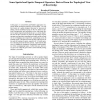Free Online Productivity Tools
i2Speak
i2Symbol
i2OCR
iTex2Img
iWeb2Print
iWeb2Shot
i2Type
iPdf2Split
iPdf2Merge
i2Bopomofo
i2Arabic
i2Style
i2Image
i2PDF
iLatex2Rtf
Sci2ools
FLAIRS
2007
2007
Some Spatial and Spatio-Temporal Operators Derived from the Topological View of Knowledge
In this paper, we extend Moss and Parikh’s approach to reasoning about topological properties of knowledge. We turn that system in a spatio-temporal direction by successively adding various modalities having on the one hand an epistemic interpretation and facilitating on the other hand spatial or spatio-temporal specifications up to a certain degree. The first of these operators is related to disjointness regarding space and ignorance regarding knowledge, and the second one to overlapping and, respectively, quantifying across all possible agents. The third one turns up along with increase of sets and no learning of agents, respectively. A fourth operator is already present in the basic system. Apart from the first case we establish the soundness, completeness and decidability of the accompanying logics. In the first case, however, we up to now could only prove that a certain naturally arising sublogic is decidable.
Artificial Intelligence | FLAIRS 2007 | Ignorance Regarding Knowledge | Spatio-temporal Direction | first Case |
| Added | 02 Oct 2010 |
| Updated | 02 Oct 2010 |
| Type | Conference |
| Year | 2007 |
| Where | FLAIRS |
| Authors | Bernhard Heinemann |
Comments (0)

